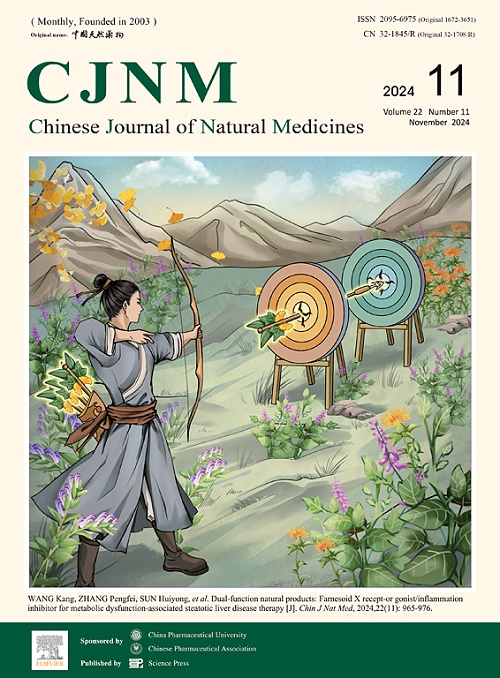Capsaicin (CAP) exerts a protective effect against ethanol-induced oxidative gastric mucosal injury by modulating the chemokine receptor 4 (CCR4)/Src/p47phox signaling pathway both in vitro and in vivo
IF 4
2区 医学
Q1 INTEGRATIVE & COMPLEMENTARY MEDICINE
引用次数: 0
Abstract
Ethanol (EtOH) is a common trigger for gastric mucosal diseases, and mitigating oxidative stress is essential for attenuating gastric mucosal damage. Capsaicin (CAP) has been identified as a potential agent to counteract oxidative damage in the gastric mucosa; however, its precise mechanism remains unclear. This study demonstrates that CAP alleviates EtOH-induced gastric mucosal injuries through two primary pathways: by suppressing the chemokine receptor 4 (CCR4)/Src/p47phox axis, thereby reducing oxidative stress, and by inhibiting the phosphorylation and nuclear translocation of nuclear factor-κB p65 (NF-κB) p65, resulting in diminished inflammatory responses. These findings elucidate the mechanistic pathways of CAP and provide a theoretical foundation for its potential therapeutic application in the treatment of gastric mucosal injuries.
在体外和体内实验中,辣椒素(Capsaicin, CAP)通过调节趋化因子受体4 (CCR4)/Src/p47phox信号通路,对乙醇诱导的氧化性胃粘膜损伤具有保护作用
乙醇(EtOH)是胃黏膜疾病的常见诱因,减轻氧化应激对减轻胃黏膜损伤至关重要。辣椒素(CAP)被认为是一种潜在的抗胃粘膜氧化损伤的药物;然而,其确切机制尚不清楚。本研究表明,CAP通过抑制趋化因子受体4 (CCR4)/Src/p47phox轴从而减轻氧化应激,抑制核因子-κB p65 (NF-κB) p65的磷酸化和核易位从而减轻炎症反应,主要通过两种途径缓解etoh诱导的胃粘膜损伤。这些发现阐明了CAP的机制途径,为其在胃粘膜损伤治疗中的潜在应用提供了理论基础。
本文章由计算机程序翻译,如有差异,请以英文原文为准。
求助全文
约1分钟内获得全文
求助全文
来源期刊

Chinese Journal of Natural Medicines
INTEGRATIVE & COMPLEMENTARY MEDICINE-PHARMACOLOGY & PHARMACY
CiteScore
7.50
自引率
4.30%
发文量
2235
期刊介绍:
The Chinese Journal of Natural Medicines (CJNM), founded and sponsored in May 2003 by China Pharmaceutical University and the Chinese Pharmaceutical Association, is devoted to communication among pharmaceutical and medical scientists interested in the advancement of Traditional Chinese Medicines (TCM). CJNM publishes articles relating to a broad spectrum of bioactive natural products, leading compounds and medicines derived from Traditional Chinese Medicines (TCM).
Topics covered by the journal are: Resources of Traditional Chinese Medicines; Interaction and complexity of prescription; Natural Products Chemistry (including structure modification, semi-and total synthesis, bio-transformation); Pharmacology of natural products and prescription (including pharmacokinetics and toxicology); Pharmaceutics and Analytical Methods of natural products.
 求助内容:
求助内容: 应助结果提醒方式:
应助结果提醒方式:


